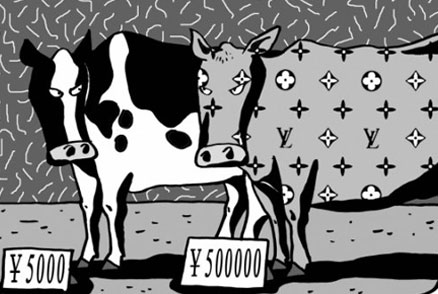In theaters in ancient China, when there was a show, some wooden tablets bearing the names of the actors would be hung at the door of the theater. The tablet placed at the very front was called the “头牌(tóupái),” referring to the lead actor in the performance. The term “大牌(dàpái)” is derived from this and is now widely used in many other ways, not merely to describe actors.

“大牌(dàpái)” is usually used as an adjective to describe a person, meaning that the person is very honorable or noble, or that he or she has won great fame and excellent achievements within a certain field like sports or show biz. For example, the term could be used in reference to Kobe Bryant, the talented basketball player; the popular actor, Benedict Cumberbatch; the respected director, Ang Lee; etc. Sometimes, the word is also used to describe big-name brands like Prada, Gucci, LV, and so on, which are world famous and quite expensive.

Example
Dàpái qiúxīng kēbǐ·bùláiēn shì zhège guǎnggào de dàiyánrén.
大牌 球星 科比·布莱恩 是 这个 广告 的 代言人。
Basketball star, Kobe Bryant, is the spokesperson of this advertisement.
X zhànjǐng zhèbù diànyǐng yǒu hěnduō dàpái míngxīng, bǐrú Zhōngguó yǎnyuán Lǐ Bīngbīng.
X 战警 这部 电影 有 很多 大牌 明星, 比如 中国 演员 李冰冰。
Many big stars acted in X-Men, such as the Chinese actress, Li Bingbing.
Mary hěn yǒuqián, tā yǒu hěnduō guójì dàpái de bāobāo.
玛莉 很 有钱, 她 有 很多 国际 大牌 的 包包。
Mary is very rich and she has many designer purses.
大牌(dàpái)” can also be used as a derogatory term to describe someone who is rude, arrogant, and who treats others with disrespect.
Example
Tā yòu jùjué le diànshìtái de cǎifǎng, zhēn dàpái!
她 又 拒绝 了 电视台 的 采访, 真 大牌!
She has refused an interview with the TV station again. She’s so arrogant and rude!
The idiom “耍大牌(shuǎdàpái)” basically means “to snub” and is always used to describe self-important or arrogant stars. We can remark that a star “耍大牌(shuǎdàpái)” if he or she looks down upon others and treats them as inferior, often attends activities late whether intentionally or not, turns down an invitation to an event which he or she has already promised to attend without any notice, rejects interviews in a rude manner, etc.
Nàgè nǚmíngxīng jīngcháng shuǎdàpái, cānjiā huódòng de shíhou chángcháng chídào!
那个 女明星 经常 耍大牌, 参加 活动 的 时候 常常 迟到!
That female star is such a snob, because she often arrives late when attending events!
Liú Déhuá shì dàmíngxīng, dànshì tā hěnshǎo shuǎdàpái.
刘 德华 是 大明星, 但是 他 很少 耍大牌。
Lau Andy is a big star, but he is seldom arrogant.
Wǒ bù xǐhuan zhège nánmótè, xīnwén jīngcháng bàodào tā shuǎdàpái!
我 不 喜欢 这个 男模特, 新闻 经常 报道 他 耍大牌!
I don’t like this male model since there are often reports about his rude and arrogant behavior in the newspaper.
Quiz
1. When we say a star is a “大牌明星(dàpái míngxīng),” what do we probably mean?
A. The star is so famous and talented.
B. The star is not popular any more.
C. The star is handsome or pretty.
2. If an actor “耍大牌(shuǎdàpái),” which of the following things might be true?
A. He’s good at playing cards.
B. He attends activities on time.
C. He refuses others in a rude manner.
3. When we say “他真大牌!(tā zhēn dàpái),” what does it mean?
A. He is such an arrogant man!
B. He looks so strong!
C. He is such a warm, nice guy!



